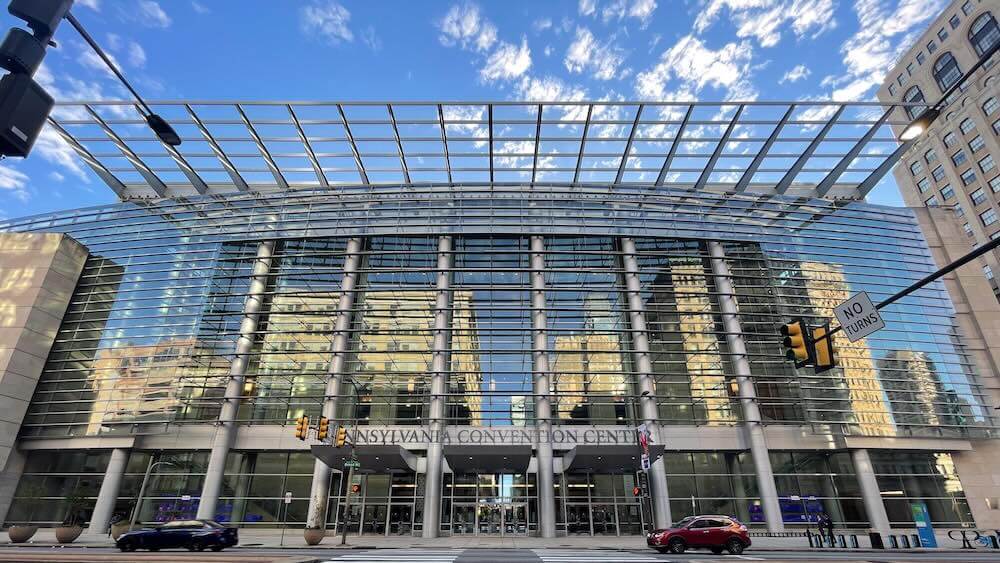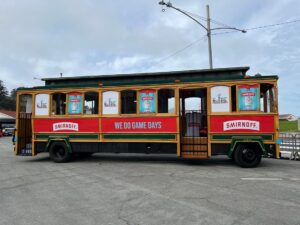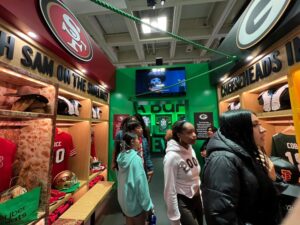


CL 26 will implement a number of leading-edge sustainability programs onsite and work with partners in Philadelphia to facilitate carbon offsets after the event.
When Convening Leaders 2026 kicks off on Jan. 11, it will mark an important anniversary in a meaningful location: 70 years of leading change in the business events industry in the city where the association now known as PCMA held its first conference for medical meeting planners in 1956. As historic as CL26 is, equally important is the forward-thinking way it is being planned, with an emphasis on sustainable practices alongside four days of cutting-edge educational programming and networking sessions.
Corey Clark
Careful attention to detail in the months leading up to the meeting is key to rolling out a sustainability program that overshoots the mark — and that means measuring the event’s environmental impact beyond its carbon footprint. “When we think about sustainability, it’s not just environmental — it’s also social,” Corey Clark, director of events and experiences at Honeycomb Strategies, a Convening Leaders 2026 event partner, told Convene in an interview. Clark said that corporate social responsibility activities are now recognized as important components of overall event sustainability programs rather than standalone initiatives. “Convening Leaders always has a social impact program that goes above and beyond with an entire day of going on site to volunteer. So, there’s that very hyperlocal, very direct impact.“
Reduce, Reuse, Recycle
Cutting back on the use of materials that cannot be recycled is a priority for this year’s meeting. Clark pointed to signage as an example of how sustainable procurement not only saves on waste but reduces spending. “When digital signage is available, always go for digital,” she said. “If that’s not an option, the first priority should be to minimize printed signage and the second to think about what you are going to do with the materials afterwards, because a landfill is not an option. So minimize, then divert.”
Convening Leaders–related materials that can’t be reused will be carefully recycled. “PCMA upcycles their vinyl [signs] into bags and takes back their clings and recycles them through other facilities. So even the materials that can’t technically be recycled through a normal hauler — [meaning that] you can’t put them in your normal dumpster in the back of the facility — we bring in separate partners to make sure that they’re recycled or upcycled,” Clark said.
The Pennsylvania Convention Center also has a role to play in terms of overall sustainability at Convening Leaders 2026. The standardized layout of the District, where partners will have their activations during the event, means that it’s easier for them to bring recycled flooring and other booth materials to Philadelphia, rather than commissioning single-use items. This practice also diverts waste from landfills, which is important to keep the meeting’s footprint as small as possible and embody PCMA’s ethos of sustainability by design. “If you use custom-cut flooring on the show floor, the general services contractor doesn’t always take those materials back to be recycled because there are too many pieces and parts,” Clark said. “They normally just landfill it on site. But this is also going to allow all the destinations” and others in the District “to have non-custom cut flooring so they can potentially reuse their flooring as well.”
Food Science
Sourcing food as locally as possible and cutting back on meat are proven practices for sustainable food-and-beverage programs and CL26 will reflect these principles — as well as accommodate the full spectrum of dietary needs. “No matter who’s there, they should feel comfortable that there are options for them,” Clark said. “You’ll see really great menu signage this year as well, showcasing that there are options for everyone with major dietary limitations.”
Minimizing food waste also is a high priority and includes paying attention to portion and serving container sizes — Clark shared the example of setting out 10-ounce carafes of salad dressing with the potential to refill them on request instead of using a more standard 20-ounce serving size for each table and keeping it full throughout the meal.
The final step for sustainable on-site F&B is redistributing any leftover food. “Convening Leaders does a lot of work to make sure that food is not wasted, and if it’s not going out to attendees,” Clark said, they can rest assured that it will be donated to local foodbanks.
- Claim or renew your subscription to Convene.
- Want deep-dive insights on events delivered to your inbox? Sign up for our newsletters.
Big Impact, Small Footprint
Convening Leaders 2026 aims to demonstrate how the business events industry can elevate its sustainable practices. Here are just some of the innovative sustainability programs in place in Philadelphia.
- Recycling stations will be available throughout the convention center, giving attendees the opportunity to recycle everything from glass and plastic bottles to their event badges, which will be printed on eco-friendly paper stock.
- Better Stands, an industry coalition dedicated to promoting, driving, and celebrating the transition from single use to reusable stands at trade shows, will issue Gold, Silver, and Bronze awards for partners’ activation stations based on their reusability.
- The Philadelphia Convention Center will make charitable donations to offset electricity use on site, and Honeycomb Strategies, one of PCMA’s sustainability partners, will calculate the impact of attendee travel to and from — and the use of shuttle buses during — Convening Leaders in Philadelphia to facilitate carbon offsets after the event.
- Sustainability-related programming at CL26 includes two sessions with author and climate advisor Joel Makower, an idea exchange hosted by the World Wildlife Fund’s Tara Dalton about data-driven approaches to reducing food waste, and sustainability tours of the Philadelphia Convention Center.
- Convening Leaders attendees can participate in “Do Good, Feel Good” projects on Jan. 11 at 1 pm, Jan. 12 at 8 am, and Jan. 13 at 8 am and buy tickets for the annual Party with a Purpose, which will be held on Jan. 12 at 8:30 pm at The Fillmore on East Allen Street.
At the Center of It All
Philadelphia’s Pennsylvania Convention Center (PCC), conveniently located downtown, checks all the boxes when it comes to sustainability initiatives. The 2 million-square-foot PCC has achieved numerous sustainability benchmarks, including the US Green Building Council’s LEED Gold certification, the Events Industry Council’s Sustainable Event Standards Gold certification, and Leadership in Energy and Environmental Design (LEED) v4.1 Operations + Maintenance (O+M): Existing Buildings Silver certification as well as LEED Gold certification for New Construction in 2011.
The PCC’s high standard for sustainability means a lighter lift for event staff and partners. “The facility is already EIC- and LEED-certified, which is huge,” Honeycomb Strategies’ Corey Clark told Convene. “Since the Pennsylvania Convention Center already has these programs in place, we don’t have to train staff and volunteers, and this makes it much easier for Convening Leaders to be sustainable from the beginning. The training has happened and they handle the donations and have great internal programs with local charities and nonprofits so that we don’t have to go out and find them.”
Kate Mulcrone is Convene’s digital managing editor.



